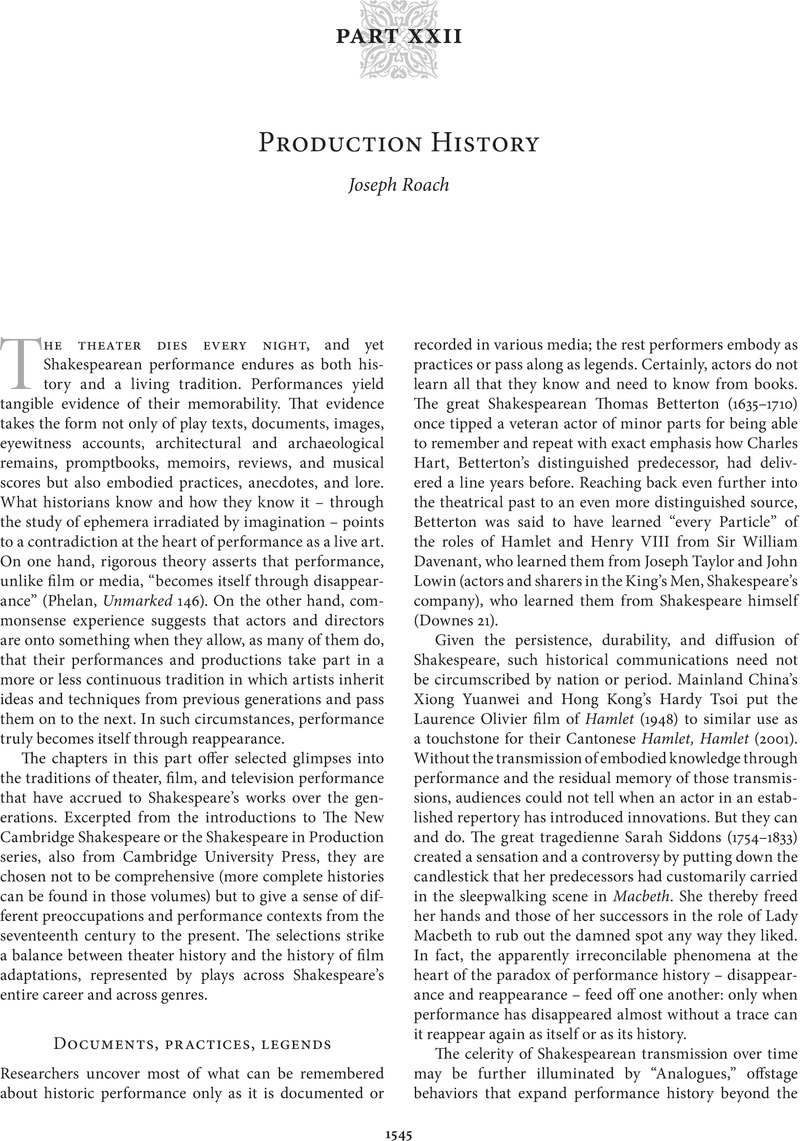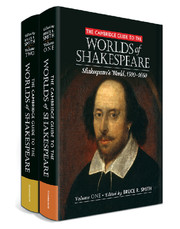Book contents
- The Cambridge Guide to the Worlds of Shakespeare
- Frontispiece
- Frontispiece
- The Cambridge Guide to the Worlds of Shakespeare
- Worlds of Shakespeare
- Copyright page
- Contents
- Illustrations
- Contributors
- Preface
- Acknowledgments
- Abbreviations
- Part I Mapping Shakespeare’s World
- Part II Theater
- Part III Language
- Part IV Science and Technology
- Part V Printing, Publishing, Textuality
- Part VI Visual Arts
- Part VII Popular Culture
- Part VIII High Culture
- Part IX England, 1560–1650
- Part X Religion
- Part XI Medicine
- Part XII The Historical William Shakespeare
- Part XIII Shakespeare’s Fellows
- Part XIV Shakespeare’s Early Reception (to 1660)
- Part XV International Encounters
- Part XVI Making the Scene
- Part XVII Shakespeare as Cultural Icon
- Part XVIII Shakespeare and Popular Culture
- Part XIX Translation
- Part XX Changing Technologies of Stage Performance
- Part XXI Audiences
- Part XXII Production History
- Introduction
- 212 1 Henry IV: Playhouse Beginnings
- 213 King Lear from the Restoration to the Nineteenth Century
- 214 Hamlet and the Actors: Restoration to Victorian Players
- 215 Henry V: Victorian Stagings
- 216 Romeo and Juliet: Victorian Actresses
- 217 The Tempest: The Design of Prospero’s Island, 1930s–1980s
- 218 Titus Andronicus: Stage and Screen after 1955
- 219 The Taming of the Shrew: Katherina Onstage from the 1970s to the 1990s
- 220 Julius Caesar: Stage Interpretations from the 1970s to the 1990s
- 221 Much Ado about Nothing: Performance History Onstage and in Film, 1980s–1990s
- 222 Macbeth, Three Influential Late Twentieth-Century Productions: Kurosawa, Polanski, Ninagawa
- 223 Measure for Measure: Stage, Film, and Television Productions at the Turn of the Twenty-First Century
- Part XXIII Printing and Reception History
- Part XXIV Shakespeare and the Book
- Part XXV Shakespeare and the Critics
- Part XXVI Shakespeare and the Performing Arts
- Part XXVII Shakespeare and the Visual Arts
- Part XXVIII Shakespeare and Media History
- Index
- References
Introduction
from Part XXII - Production History
Published online by Cambridge University Press: 17 August 2019
- The Cambridge Guide to the Worlds of Shakespeare
- Frontispiece
- Frontispiece
- The Cambridge Guide to the Worlds of Shakespeare
- Worlds of Shakespeare
- Copyright page
- Contents
- Illustrations
- Contributors
- Preface
- Acknowledgments
- Abbreviations
- Part I Mapping Shakespeare’s World
- Part II Theater
- Part III Language
- Part IV Science and Technology
- Part V Printing, Publishing, Textuality
- Part VI Visual Arts
- Part VII Popular Culture
- Part VIII High Culture
- Part IX England, 1560–1650
- Part X Religion
- Part XI Medicine
- Part XII The Historical William Shakespeare
- Part XIII Shakespeare’s Fellows
- Part XIV Shakespeare’s Early Reception (to 1660)
- Part XV International Encounters
- Part XVI Making the Scene
- Part XVII Shakespeare as Cultural Icon
- Part XVIII Shakespeare and Popular Culture
- Part XIX Translation
- Part XX Changing Technologies of Stage Performance
- Part XXI Audiences
- Part XXII Production History
- Introduction
- 212 1 Henry IV: Playhouse Beginnings
- 213 King Lear from the Restoration to the Nineteenth Century
- 214 Hamlet and the Actors: Restoration to Victorian Players
- 215 Henry V: Victorian Stagings
- 216 Romeo and Juliet: Victorian Actresses
- 217 The Tempest: The Design of Prospero’s Island, 1930s–1980s
- 218 Titus Andronicus: Stage and Screen after 1955
- 219 The Taming of the Shrew: Katherina Onstage from the 1970s to the 1990s
- 220 Julius Caesar: Stage Interpretations from the 1970s to the 1990s
- 221 Much Ado about Nothing: Performance History Onstage and in Film, 1980s–1990s
- 222 Macbeth, Three Influential Late Twentieth-Century Productions: Kurosawa, Polanski, Ninagawa
- 223 Measure for Measure: Stage, Film, and Television Productions at the Turn of the Twenty-First Century
- Part XXIII Printing and Reception History
- Part XXIV Shakespeare and the Book
- Part XXV Shakespeare and the Critics
- Part XXVI Shakespeare and the Performing Arts
- Part XXVII Shakespeare and the Visual Arts
- Part XXVIII Shakespeare and Media History
- Index
- References
Summary

- Type
- Chapter
- Information
- The Cambridge Guide to the Worlds of Shakespeare , pp. 1545 - 1557Publisher: Cambridge University PressPrint publication year: 2016



